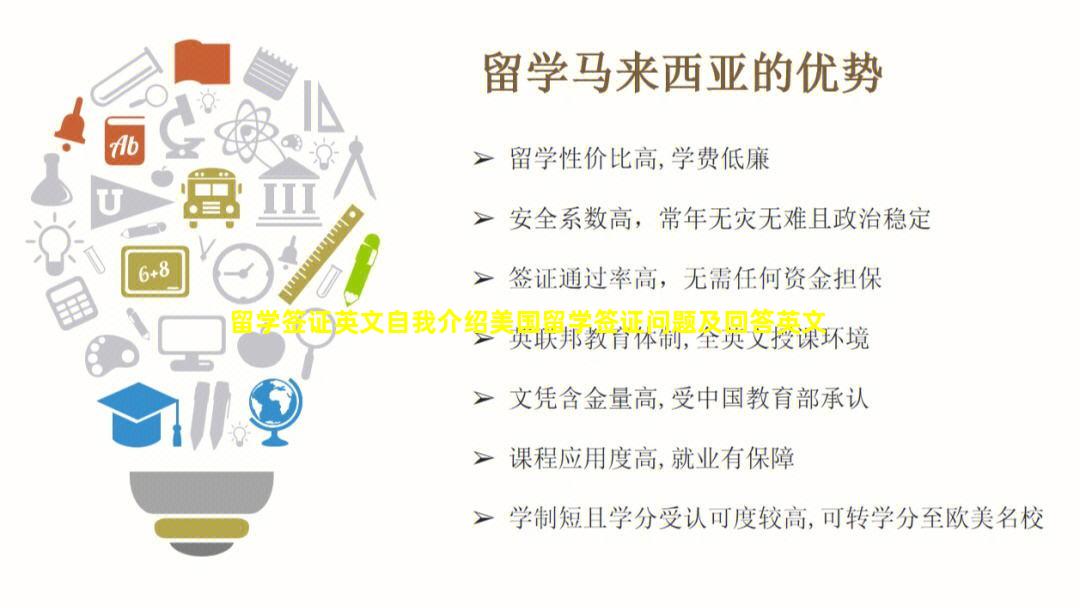 锦泰留学网
锦泰留学网Good morning/afternoon/evening,
My name is [your name], and I am very excited to have the opportunity to introduce myself to all of you. I am from [your country], and I am applying for a study visa to pursue higher education in [destination country]. Today, I'd like to share a few things about myself and why I am interested in studying abroad.
Firstly, let me tell you a bit about my educational background. I completed my high school education from [name of school] in [year]. During my time there, I excelled academically, consistently achieving top grades in a range of subjects. I have always been a curious learner, eager to explore new areas of knowledge and understand different cultures. This passion for learning led me to consider studying abroad.
One of the main reasons why I am interested in studying abroad is the opportunity to gain a global perspective. I believe that experiencing different cultures and interacting with people from diverse backgrounds will broaden my horizons and help me develop a more open and inclusive mindset. I am particularly fascinated by the multicultural environment in [destination country], which will allow me to learn from people with various perspectives and experiences.
Furthermore, studying in [destination country] will provide me with access to top-notch educational resources and facilities. The universities there are renowned for their academic excellence and research opportunities. By being part of such a prestigious institution, I will be able to receive an outstanding education that will equip me with the skills and expertise necessary to excel in my chosen field.

Lastly, studying abroad will give me the chance to become more independent and self-reliant. Living in a new country, away from my family and familiar surroundings, will push me out of my comfort zone and encourage personal growth. I believe that these experiences will help me develop important life skills such as adaptability, resilience, and problem-solving abilities.
In conclusion, I am truly excited about the prospect of studying abroad. I am confident that the rich cultural experiences, excellent education, and personal growth that studying overseas offers will provide me with a solid foundation for future success. Thank you for considering my application, and I look forward to the opportunity to contribute positively to [destination country]'s academic community.
Thank you.
Q: What types of student visas are available for studying in the United States?
A: There are two main types of student visas available for studying in the United States. The F-1 visa is for academic studies and the M-1 visa is for vocational studies.
Q: How do I apply for a student visa?
A: To apply for a student visa, you must first be accepted by a Student and Exchange Visitor Program (SEVP)-certified school in the United States. After receiving an acceptance letter, you can then proceed to complete the Online Nonimmigrant Visa Application and schedule an interview at a U.S. embassy or consulate in your country.
Q: What documents do I need to apply for a student visa?
A: The documents required for a student visa application may vary, but typically include a valid passport, a completed visa application form, a DS-160 confirmation page, a SEVIS-generated I-20 form from your school, proof of payment of the SEVIS fee, evidence of financial support, and any additional documents requested by the embassy or consulate.
Q: How long does it take to process a student visa?
A: The processing time for a student visa can vary depending on the embassy or consulate where you apply. It is recommended to apply for a visa as early as possible, as the wait time can be several weeks to a few months.
Q: Can I work while studying on a student visa?
A: Yes, but there are limitations. F-1 visa holders can work on-campus for a maximum of 20 hours per week during the academic year and full-time during designated breaks. Off-campus work is allowed with certain restrictions, such as Curricular Practical Training (CPT) or Optional Practical Training (OPT) authorization.
Q: Can I bring my spouse or children on a student visa?
A: Spouses and children of F-1 visa holders can join them in the United States on an F-2 visa. However, F-2 visa holders are not allowed to work, but they can study part-time. M-1 visa holders are generally not allowed to bring dependents.
Q: What happens if my student visa expires before I complete my studies?
A: It is important to maintain valid visa status while studying in the United States. If your visa expires before you complete your studies, you may need to apply for an extension or request a change of status. It is advised to consult with an immigration attorney for guidance.
Q: Can I travel outside of the United States during my studies?
A: Yes, you can travel outside of the United States during your studies, but it is important to have a valid visa and the necessary documentation to re-enter the country. You will need to present your valid I-20 form and a valid passport when returning to the United States.
美国留学签证的主要语言是英文。申请人需要在申请材料、面试和签证文件中使用英文进行沟通。申请人可以根据个人需求,在对抗衡材料和与签证官进行沟通时使用中文。
在申请美国留学签证时,有一定的英文要求。你需要填写申请表格,参加面试,以及与签证官进行沟通。这些过程中,你需要用到基本的英文能力,如理解问题、回答问题和表达自己的意见。
如果你的英文能力不够强,可能会遇到一些困难。这并不意味着你无法办理留学签证。可以考虑以下几点来克服这个问题:
1. 寻求帮助:你可以寻求一些专业的机构或个人的帮助,他们可以帮你准备材料、提供指导和建议。
2. 学习英文:提前学习一些基本的英文会有很大的帮助。在申请签证之前,可以参加英语课程或者雇佣一位英语教师来帮助提高口语能力。
3. 事先准备:提前做好准备,了解常见的问题和答案,以便在面试中能够流利地回答问题。
4. 使用翻译工具:在申请签证过程中,你可以使用一些在线翻译工具来帮助你理解和回答问题。签证官可能不允许使用这些工具进行交流,所以最好是自己进行一些基本的英文沟通。

5. 运用身体语言:即使你的英文能力有限,你可以通过举手、点头、微笑等方式来与签证官进行基础的沟通。
虽然留学签证需要一定的英文能力,但并不意味着你必须精通英语才能办理。你可以通过寻求帮助、学习英文以及事先准备等方式来克服语言障碍,并成功申请到美国留学签证。